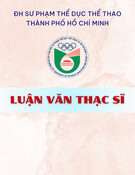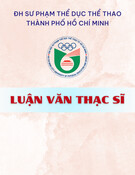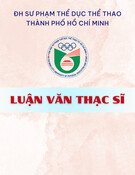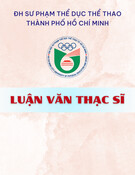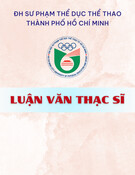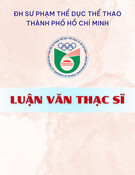
MINISTRY OF EDUCATION AND TRAINING
THE VIET NAM NATIONAL INSTITUTE OF EDUCATIONAL SCIENCES
NGUYEN THI THANH LOAN
DEVELOPMENT OF LOWER SECONDARY SCHOOL TEACHERS
IN HA NOI CITY BY PROFESSIONAL TITLE STANDARDS
MAJOR IN EDUCATIONAL MANAGEMENT
Code: 9140114
DOCTORAL THESIS SUMMARY OF EDUCATIONAL SCIENCES
HANOI – 2021

The doctoral thesis completed at the Viet Nam National Institute of Educational
Sciences in 2021.
PhD supervisor: 1. Assoc. Prof. Dr. Vuong Thanh Huong
2. Assoc. Prof. Dr. Do Thi Bich Loan
Reviewer 1: ....................................................................
...................................................................
Reviewer 2: ....................................................................
...................................................................
Reviewer 3: ....................................................................
...................................................................
The doctoral thesis will be defended at the institutional level in front
of the Thesis Examination Committee of the Viet Nam Institute of Educational
Sciences, 101 Tran Hung Dao Street, Ha Noi, Viet Nam.
At ..... hour ..... day ..... month ......
Thesis can be found at:
- The Vietnamese National Library.
- The Library of the Viet Nam Institute of Educational Sciences.

1
INTRODUCTION
1. The necessity of the research theme
Adjusting and supplementing professional title standards for education
managers and teachers; reviewing the contingent of education managers and
teachers at all levels, developing projects on teacher training and upskilling to
improve professionalism in the context of integration are important solutions of
our Party and State.
Development of lower secondary school teachers by professional title
standards is considered one of the indispensable and urgent solutions to
improve the teaching quality in the education reform process in general and
junior high education in particular.
Ha Noi, the capital of Vietnam enjoys the Law on the capital and its
education quality is ranked the top of the country. However, the development
of lower secondary school teachers in the city by professional title standards
has not been paid much concern. To the above mentioned aspects of theory and
practice, the author chooses the research theme "Development of lower
secondary school teachers in Ha Noi city by professional title standards" as a
doctoral dissertation.
2. Research purposes: to recommend solutions to develop public lower
secondary school teachers by professional title standards in Ha Noi in order to
improve the quality of teachers for the requirements of educational innovation
based on theoretical and practical research.
3.1. Research population and research focus
3.1. Research population: Teachers in public junior high school.
3.2. Research focus: development of public lower secondary school
teachers in Ha Noi city by professional title standards.
4. Scope of research:
(i) Scope of research content: development of lower secondary school
teachers in public lower secondary schools in Ha Noi city; (ii) Scope of
research space: public lower secondary schools in Ha Noi city (excluding
special and multi-level schools); Research samples: 397 teachers and
education managers (including lower secondary school managers;
administrators of Department/Division of Home Affairs and
Department/Division of Education and Training
5. Research hypothesis: If solutions such as planning the development of
lower secondary school teachers by professional title standards in association

2
with the school development strategy and local education; recruiting lower
secondary school teachers by professional title standards; building capacity for
lower secondary school teachers to meet the requirements of professional title
ranks and professional title standards; developing internal inspection
regulations in line with professional title standards and creating a motivating
environment for professional title standard-based development of lower
secondary school teachers are synchronously implemented, the quality of
lower secondary school teachers in Ha Noi city will be improved to meet the
requirements of job positions, professional title ranks and the 2018 General
Education Program as well as innovation of education and training.
6. Research tasks
6.1. To research theoretical basis for the development of lower secondary
school teachers by professional title standards.
6.2. To research practical basis for the development of lower secondary
school teachers in Ha Noi city by professional title standards.
6.3. To recommend and experiment solutions for the development of
lower secondary school teachers in Ha Noi city by professional title standards.
7. Research methods and methodology
7.1. Methodologies: System approach; Standard-based approach;
Human resource development management-based approach; Practice-based
approach.
7.2. Research methods: Theoretical research methods; Practical research
methods: questionnaire; experts; empirical methods; in-depth interview;
experiment; Data processing methods (SPSS software-based mathematical
statistical methods).
8. Defensive arguments
8.1. Development of lower secondary school teachers by professional title
standards will be effective when it is implemented based on human resource
development, standardization, professional title rank standards, the context of
the locality and the education and training innovation.
8.2. Development of lower secondary school teachers will be effective
when it is implemented based on human resource development in association
with job positions and professional title standards.
8.3. Development of lower secondary school teachers in Ha Noi city will
be effective when the following resolutions such as planning the development
of lower secondary school teachers in Ha Noi city by professional title

3
standards in association with the school’s development strategy and the local
education; recruiting secondary school teachers by professional title standards;
training and building capacity for lower secondary school teachers to meet the
requirements of professional title ranks and professional title standards;
developing internal inspection regulations in line with professional title
standards and creating a motivating environment for professional title standard-
based development of lower secondary school teachers are synchronously
implemented.
9. New contribution of the dissertation
9.1. Systematizing, supplementing and clarifying the theory on
development of lower secondary school teachers by professional title standards,
systematizing professional title standards and classifying lower secondary
school teachers by professional title standards for better implementation of
policies on teacher quality improvement based on competence and job
positions.
9.2. Proposing a set of professional title rank-based evaluation criteria for
lower secondary school teachers that ensures objectivity, demonstrates the
characteristics of public employees working in the education sector, and
provides a basis for recruitment, use, training, and development of the
contingent of lower secondary school teachers in Ha Noi city by professional
title standards.
9.3. Recommending solutions for development of lower secondary school
teachers by professional title standards in consistent with the context of Ha Noi
city.
10. Dissertation structure: In addition to its introduction, conclusion,
recommendation, list of references and annex, the dissertation is structured into
3 chapters.
Chapter 1
THEORETICAL RATIONALES ON DEVELOPMENT OF JUNIOR
HIGH SCHOOL TEACHERS BY PROFESSIONAL TITLE STANDARDS
1.1. Overview of previous related research
1.1.1. Research on lower secondary school teachers
1.1.2. Research on development of lower secondary school teachers
1.1.3. Assessment of previous research and identification of contents to
be focused for research



